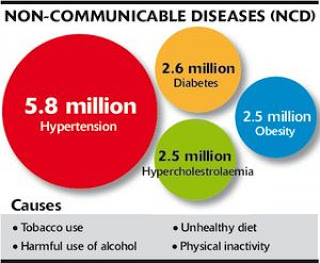
Source: healthymalaysianfamily.com
Non-communicable disease is the current epidemic affecting Malaysia. It is the current health burden of the country. But do we all know what it is?
According to the World Health Organization, non-communicable diseases (NCDs), are mostly chronic diseases which cannot be passed from one person to another. These diseases usually progress slowly and last for a long duration, a majority of them last for a lifetime.
Non-communicable diseases can be divided into
- cardiovascular diseases (e.g heart attacks and stroke, hypertension, hypercholesterolemia),
- cancers
- chronic respiratory diseases (e.g chronic obstructed pulmonary disease and asthma)
- diabetes
- mental illness
- injury related conditions
In the recent National Health and Morbidity Survey 2011, we learned:
DIABETES MELLITUS
- 15.2% (2.6 million) of adults 18 years and above have diabetes
- 7.2% are known to have diabetes
- 8.0% are previously undiagnosed with diabetes.
HYPERTENSION
- 32.7% (5.8 million) of adults 18 years and above have hypertension
- 12.8% are known to have hypertension
- 19.8% are previously undiagnosed with hypertension
HYPERCHOLESTEROLEMIA
- 35.1% (6.2 million) of adults 18 years and above have hypercholesterolemia
- o 8.4% are known to have hypercholesterolemia
- o 26.6% are previously undiagnosed with hypercholesterolemia
These numbers are alarming, even if they are not, they should be. Do not be dismayed; lifestyle changes play an important role in addressing some of the modifiable risk factors for NCD. Firstly, we have to understand that there are 2 types of risk factors, non-modifiable (things we cannot change, like our age, sex, ethnicity) and modifiable (things we can actually do something about).
Let us tackle the 2 biggest modifiable risk factors for major NCDs; unhealthy eating habits and physical inactivity. How exactly do we do that?
- We should accept the fact that overweight and obesity is a real health threat.
- We have to develop healthy eating habits among Malaysians. With our tasty local food, it may seem impossible but it is not. Less fat, less oil, less salt, less sugar. Find ways to maintain the flavour but reduce the danger. Get creative!
- Practice active living (physical activity) / exercise. Go for brisk walks, play football with the kids, take the stairs, go for a swim, ride a bicycle to work, get off that chair!
- We should aware of other NCD risk factors and realize the importance of early and regular screenings (family history, smoking status, mental stress, alcohol abuse, dyslipidaemia, hypertension and elevated blood glucose) . Basically, be aware of our own individual health status. Do not be dismissive of our own health.
As with other problems, the first step is to acknowledge that there is a problem. Once we do that, the rest is easy, well maybe not easy but at least it’s a start. So instead of accepting non-communicable diseases as being the price of modernity, we should be serious in taking preventative steps to ensure that it is not.
Dr Hidayatul Radziah is a trainee lecturer of Pharmacology at a local university. She is the current Chief Editor of The Malaysian Medical Gazette. Find out more about her at The Team page.
[This article belongs to The Malaysian Medical Gazette. Any republication (online or offline) without written permission from The Malaysian Medical Gazette is prohibited.]
References:
- National Health and Morbidity Survey 2011 (Fact Sheet)
- Non communicable diseases (WHO) March 2013
- National Strategic Plan for Non Communicable Disease (2010-2014)
